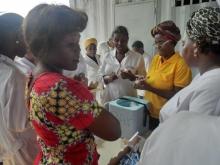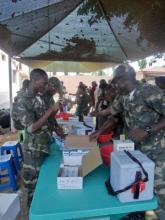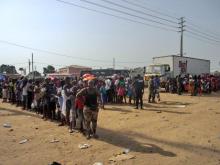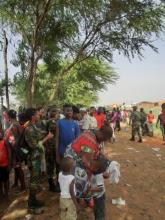WHO strengthens technical support to Angola to respond to Yellow Fever outbreak
Luanda, 1st March 2016 - The World Health organization (WHO) is intensifying its technical support to Angola to ensure an integrated multi-sectoral response to the Yellow Fever Outbreak this Southern African country is experiencing since December 2015. As of 29th February 2016, a total of 634 suspected cases, 110 deaths and 25 confirmed cases have been reported.
A team of about twenty (20) experts in different technical areas has been deployed to Angola to support the Ministry of Health and strengthen field operations. WHO is working in close collaboration with other national and international organizations and partners involved in the national response to the outbreak like UNICEF, CDC/Atlanta, Médecins Sans Frontières (MSF), the National Army and the National Red Cross. The support provided by the WHO includes financial and technical assistance in areas such as epidemiological surveillance, diagnosis and laboratory, logistics, vector control, data management, social mobilization and community engagement.
The first cases of the current Yellow Fever in Angola were detected in the district of Viana located about 30 km from Luanda. More suspected cases were also reported in other Districts of the province as well as in other provinces of the country, namely Huíla, Kwanza Sul and Huambo. WHO experts are also supporting epidemiological investigation and laboratory confirmation of cases in these provinces.
Additional interventions to control the Yellow Fever outbreak include the training of community volunteers, capacity building of health officials to improve diagnosis and advocacy to improve sanitation and solid waste management in high risk areas where vector control experts and entomologists found a high density of infected Aedes aegypty, the mosquito that transmits the Yellow Fever.
On the 2nd February 2016, national authorities launched a Yellow Fever mass vaccination campaign to contain the outbreak in the province of Luanda. The province has an estimated population of 6,7 million inhabitants and, up to date, a total of 2,72 million people have been vaccinated in the districts of Viana and Belas, where confirmed cases were reported. The target group for this vaccination are all people over six months of age. The demand for vaccination is very high and every day huge number of populations is seeking to be vaccinated.
National authorities are currently facing challenges and constraints to secure the success of operations such as lack of materials for community sensitization and education, human resources, insufficient funds for operational costs including for transport of vaccines and vaccination teams. In order to address these challenges WHO supported the elaboration of an emergency response plan estimated on US$ 2,3 million.
With the support WHO, a total of six million doses of vaccines have been procured to Angola for the vaccination campaign. WHO has also provided financial support to the national authorities on an amount of US$289,383.65 from the African Public Health Emergency Fund (APHEF) and is about to release another 499,449 USD from the Contingency Fund for Emergency (CFE) to support operational costs incurred in the campaign.
Despite the difficulties in the implementation of the response, after 20 days of vaccination campaign, a decreasing number of reported suspected cases is already being observed passing from 220 in the previous week to 110 during the week of the 22nd of February 2016. Deaths have also decreased from 20 to 10 within the same period of time. The outbreak is currently limited to the province of Luanda and there is no evidence of local transmission in other provinces so far.
Global multi-sectoral coordination efforts to support the response to the outbreak and the political commitment of national authorities are critical to facilitate the quick success of the response.
________________________________________
For more information, please contact:
Technical contacts:
Dr Jean-Marie Kipela, Tel: +244 941280588; Email: kipelam [at] who.int
Dr François Nguessan, Tel: +244930443862; Email: nguessanf [at] who.int







